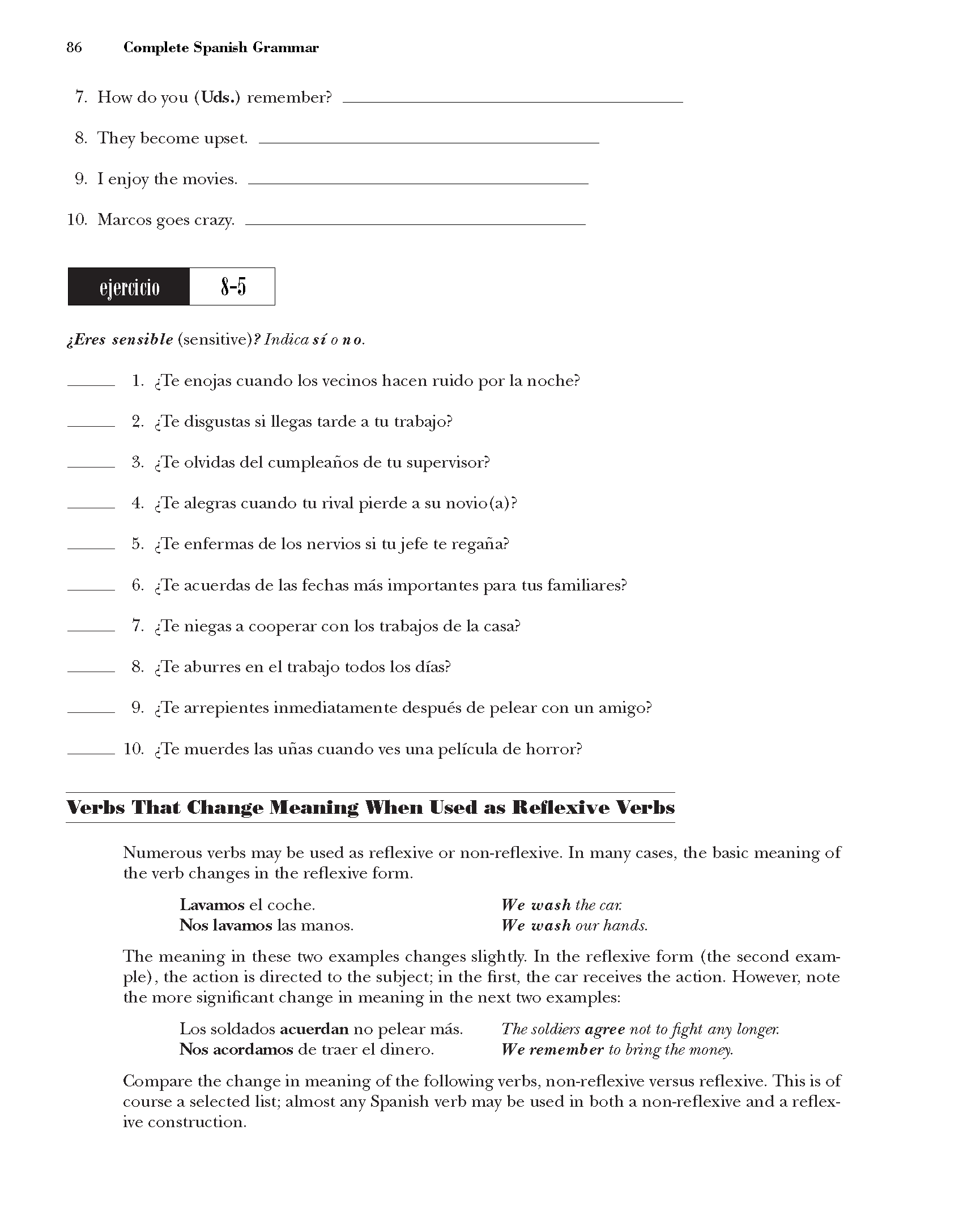CSG097

86 Complete Spanish Grammar
7. How do you (Uds.) remember?
8. They become upset. _
9. I enjoy the movies. _
10. Marcos goes crazy. _
8-5
ejercicio
lEres sensible (sensitive)? Indica si ono.
_ 1. ^Te enojas cuando los vecinos hacen ruido por la noche?
_ 2. ^Te disgustas si llegas tarde a tu trabajo?
_ S. ^Te olvidas del cumpleańos de tu supervisor?
_ 4. (/Te alegras cuando tu rival pierde a su novio(a)?
_ 5. ^Te enfermas de los nervios si tu jefe te regana?
_ 6. ple acuerdas de las fechas mas importantes para tus familiares?
_ 7. (/Te niegas a cooperar eon los trabajos de la casa?
_ 8. (/Te aburres en el trabajo todos los dias?
_ 9. (/Te arrepientes inmediatamente despues de pelear eon un amigo?
_ 10. (/Te muerdes las uńas cuando ves una pelicula de horror?
Verl)s That Change Meaning Wlien Used as Reflexive Verbs
Numerous verbs may be used as reflexive or non-reflexive. In many cases, the basie meaning of the verb changes in the reflexive form.
Lavamos el coche. We wash the car.
Nos lavamos las manos. We wash our hands.
The meaning in these two examples changes slightly. In the reflexive form (the second exam-ple), the action is directed to the subject; in the first, the car receives the action. However, notę the morę significant change in meaning in the next two examples:
Los soldados aeuerdan no pelear mas. The soldiers agree not to fight any longer.
Nos acordamos de traer el dinero. We remember to bńng the money.
Compare the change in meaning of the following verbs, non-reflexive versus reflexive. This is of course a selected list; almost any Spanish verb may be used in both a non-reflexive and a reflex-ive eon s truć tion.
Wyszukiwarka
Podobne podstrony:
CSG297 286 Complete Spanish Grammarejercicio En espańol. Usa la preposición para. Asyou do the exerc
CSG019 8 Complete Spanish GrammarIrregular Verbs in the Present Tense Many Spanish verbs do not foll
CSG035 24 Complete Spanish Grammarejercicio Practica. En espanol. Usa el presente. 1. &n
CSG157 146 Complete Spanish GrammarWlieii Is the Present Perfeet Subjunctive Used in Spanish? You re
CSG285 274 Complete Spanish GrammarComparisons w illi Advei1 2bs Go back to the unit on adjectives (
CSG297 286 Complete Spanish Grammarejercicio En espańol. Usa la preposición para. Asyou do the exerc
CSG309 298 Complete Spanish GrammarOther ]egative Expres$ions Some of the words you have studied in
12fig07 rę, options - Microsoft Visual Basic [run] File Edit View insert Run Jools Add-lns Help How
7 Team work 224 7.1 Who do you work together with? 125 7.2 How d
40. Środki transportu: He usually drives to work but sometimes he takes the bus. How do you travel t
musc dev031 HOW DO YOU LOOK IN A BATHINC SUIT? Onr of my pupiU tnappod on the bo uch Inst aummer, !•
więcej podobnych podstron